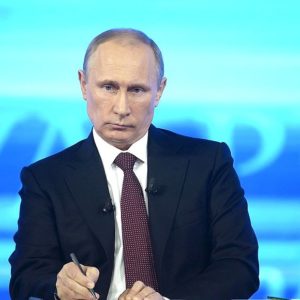Suddenly, Russia’s President Vladimir Putin has extended his power and influence over an entire country before anyone quite realized what was happening.
No, we’re not talking about Ukraine, where Russian troops look across the line against inferior Ukrainian forces that may or may not be confident of support from the entire North Atlantic Treaty Organization, including the U.S. Putin may not want to risk conflict with NATO, but he’s quickly sent his forces into Kazakhstan without the slightest opposition.
That’s because, in the case of Kazakhstan, the president, Kassym-Jomart Tokayev, asked the Russians to defend his regime against protesters angered over a sudden increase in the prices of oil and gas. All he had to do was ask Putin to come to his rescue, and Putin was glad to comply.
The arrival of a few thousand Russian troops into Kazakhstan was probably the most dramatic sign we’ve seen so far of Putin’s dream of Russia’s resurgence as a great power. In effect, Kazakhstan is a Russian protectorate, not yet ruled or governed by Russia but under Russia’s protection.
It was only three decades ago that Kazakhstan, a country of only 19-20 million people, 20 percent of them Russian and spread over land about two-thirds as large as western Europe, broke off from the former Soviet Union. The break was reluctant. All the other countries of the former Soviet-dominated eastern Europe and central Asia had already been torn away with the collapse of Soviet power. Kazakhstan, oil-rich and strategically situated at the heart of central Asia, did not feel the same resentment of Kremlin rule as did other Soviet satellites.
Listening to the news in Doha, the capital of Qatar, one realizes the enormity of the Russian entry into Kazakhstan. The speed with which Putin complied with the request for Russian troops shows his eagerness to expand Russian rule over what was once the Soviet empire. He’s far from taking over other former Soviet satellites, but clearly, he would like to be the leader of the new Russia, taking its place again as one of the world’s greatest powers.
It’s hard to believe that Russian troops, now that they’re welcomed back in Kazakhstan, at least by the regime that’s now in power, won’t stay as a permanent force. Eventually, the Russians will want to take over a role in advising and then ruling Kazakhstan, rich in oil and other natural resources that the Russians need for their hard-pressed economy. The Russians, with a grip on security, should be in a position to edge out foreign companies also exploiting the country’s resources.
The success of the Russians in returning to Kazakhstan has implications for every country with a stake and interest in the area. The United States, China, South Korea and Japan all have their own stakes in the country. South Korea and Japan have each invested several billion dollars into the country while importing oil and other resources. Korea has another special interest in Kazakhstan. About 100,000 ethnic Koreans, most of them living in the Russian far east, had to move there in the 1930s on orders of the Soviet dictator Josef Stalin.
The Koreans suffered terribly in the move to Kazakhstan. Although they posed no immediate threat to Stalin or Soviet rule, they had to exist under harsh conditions, surviving in a cold and forbidding land. They have to look on a revived Russian presence with foreboding.
The revived Russian presence in Kazakhstan does not pose an immediate threat to that of other countries. Still, by asserting Russian force in a country that had broken away from the Soviet Union, Putin leaves no doubt of his desire to extend Russian influence and control beyond its own borders. He also would hope to extend Russian influence over the Korean peninsula by supporting North Korea against the United States.
The Russian troops in Kazakhstan arrived in convoys of trucks and armored vehicles and also by plane. They are seen on Al Jazeera, the television network based in Doha, hefting weapons as they quickly set up defenses around the airport and capital, Nursultan, and the largest city Almaty, where many of the ethnic Koreans live.
The response of Kazakhstan to Russian troops is just the opposite of that of Afghanistan when Russians battled Afghans in the final phase of the Soviet empire. It is hard to imagine the people of Kazakhstan welcoming the Russians. The president of Kazakhstan, before asking for Russian military support, ordered his own troops to fire on protesters without warning.
Putin has exploited a weakness, and an opportunity, with grave overtones for others within reach of the renaissance of Russian power, including the Korean peninsula.

